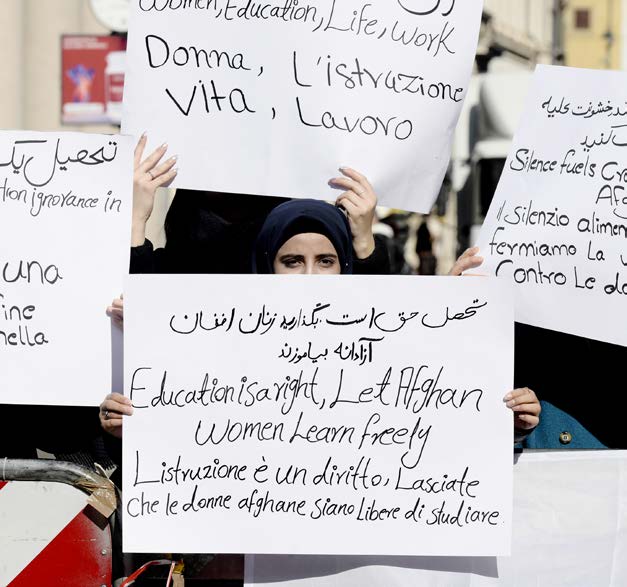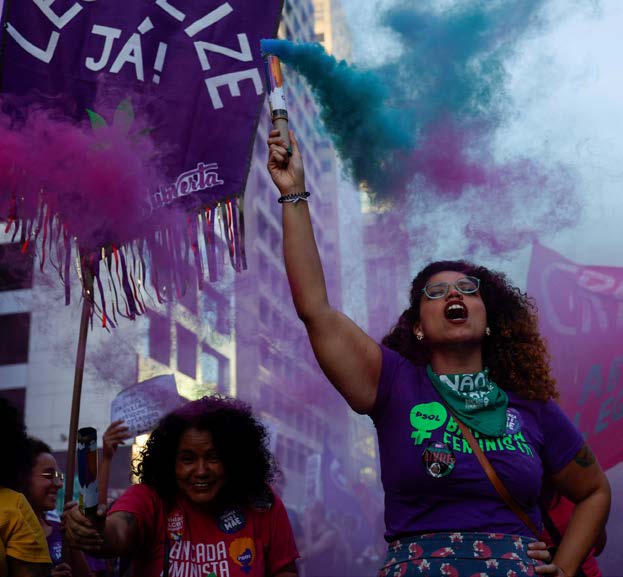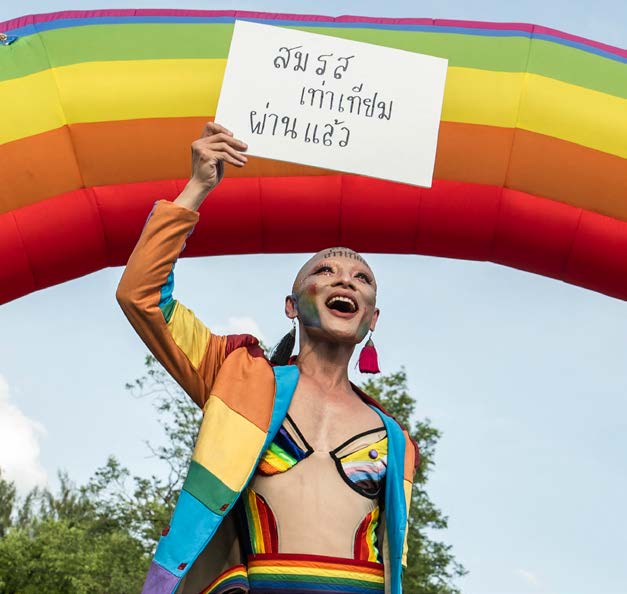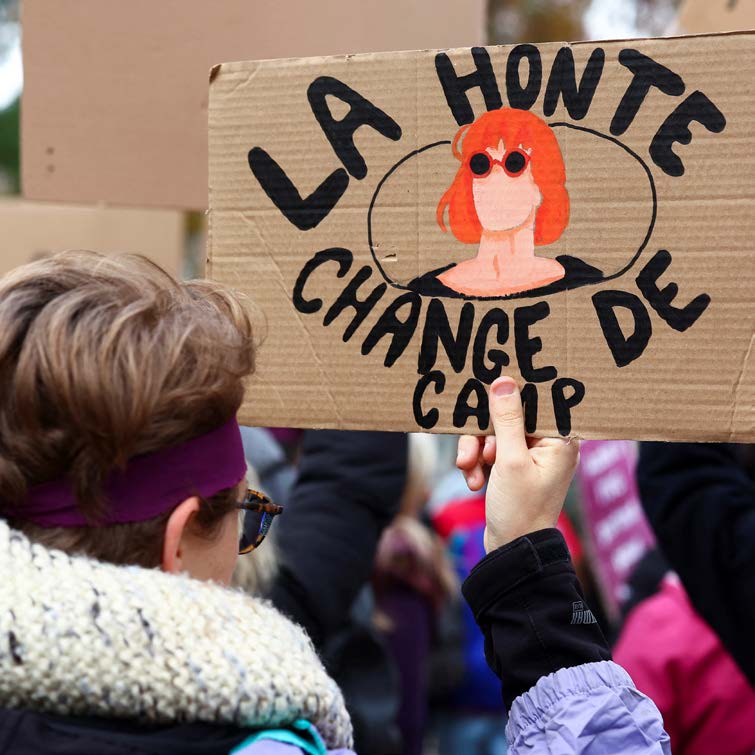Table of Contents
- 2025 State of Civil Society Report
- Overview +
- Conflict: might replaces right +
- Democracy: regression and resilience +
- Economy: the era of precarity and inequality +
- Climate and environment: heading in the wrong direction +
- Technology: human perils of digital power +
- Gender rights: backlash, resistance and persistence +
- Migrants’ rights: humanity versus hostility +
- United Nations: global governance in crisis +
- Civil society: the struggle continues +
- Acknowledgements +
- Download Report +

- Gender rights are regressing globally due to the rise of right-wing populism and anti-rights policies.
- Anti-LGBTQI+ legislation is spreading across regions and is increasingly being used as a tool of political control.
- Through strategic resistance and persistence, civil society continues to win victories for women’s and LGBTQI+ rights.
The rollback of DEI initiatives so enthusiastically backed by leading tech companies is one of the ways in which Trump’s return has quickly dismantled protections for women’s and LGBTQI+ rights. These are under attack by right-wing populists the world over.

Ahead of International Women’s Day, women protest against gender apartheid and call for the UN to recognise the systematic oppression of women as a crime against humanity in Rome, Italy, 7 March 2025. Photo by Simona Granati/Corbis via Getty Images.
Meanwhile the impacts of the USAID spending freeze will disproportionately affect women and girls, particularly those in conflict zones, rural areas and the world’s least wealthy countries. The Guttmacher Institute projects that the freeze will deny 11.7 million women access to contraception, potentially leading to 4.2 million unintended pregnancies and over 8,300 maternal deaths. Even if the spending pause ends, the Trump administration has also reinstated the global gag rule, which restricts aid to organisations that provide or advocate for abortion services. During Trump’s first term, this policy resulted in around 108,000 maternal and child deaths and 360,000 new HIV infections.
These shifts reflect a broader global trend of right-wing movements targeting gender rights, with surveys in countries with a recent track record of policies to improve rights increasingly showing that many, particularly young men, believe efforts to promote gender equality have gone too far, even though the Sustainable Development Goals (SDG) Gender Index shows how far even the most progressive countries are from gender equality.
Activists across continents link much of the backlash to the growing organisation and mobilisation of anti-rights forces, in a backlash that encompasses social media disinformation, hate speech and misogyny and extends beyond national borders into international forums. Over the years, and 2024 was no exception, activists have observed the growing presence of increasingly vocal anti-gender groups at the UN Commission on the Status of Women, which convenes every March with the stated aim of advancing gender justice.
There’s a disturbing pattern of rights erosion spanning multiple regions. The most extreme example of gender rights regression remains Afghanistan, where the Taliban has methodically constructed a comprehensive system of gender apartheid. Women have been systematically stripped of their rights to work, education and leisure, increasingly confined to their homes in an attempt to literally silence their voices and erase them from public life.
In Iran, the aftermath of widespread 2022 and 2023 protests sparked by the death in custody of Mahsa Amini, a young woman detained for breaching hijab laws, showed the theocratic regime’s determination to maintain control through brutal repression. The crackdown left over 500 dead, thousands injured and many more imprisoned. This was followed by a wave of executions aimed at creating fear and discouraging further mobilisation attempts.
In another alarming case of regression, Iraq’s parliament is considering amendments to the 1959 Personal Status Law that could lower the minimum marriage age to nine and remove women’s rights to divorce, custody and inheritance. The situation for LGBTQI+ people also remains dire, with parliament passing legislation imposing severe prison penalties for same-sex relations and transgender identities.
In Russia, the government’s campaign against ‘child-free propaganda’ represents a new form of state control over women’s bodies and choices. Parliament passed a bill banning the promotion of what it calls a ‘childless lifestyle’ in media, films and online content. The government characterised this as an effort to promote ‘traditional family values’ and address demographic challenges exacerbated by the war in Ukraine. This is part of a trend seen in recent years in which right-wing populists and nationalists, including in Hungary and Italy, have introduced policies to counter falling birthrates. The motivations are at least partly racist, inspired by the white supremacist ‘great replacement’ conspiracy theory that white Christian populations are being replaced by Black and Brown Muslim people. These policies dovetail with restrictions on women’s reproductive rights, including abortion rights, and LGBTQI+ rights.
One of the ways in which Georgia followed Russia’s lead was by introducing a law to severely restrict LGBTQI+ people and organisations. Bulgaria’s parliament took similar steps, passing an education law banning ‘LGBTQI+ propaganda’ in schools by a significant majority, despite vocal street protests. The law aimed to appeal to far-right voters at a time of political volatility. Proposed by a pro-Russia party, it criminalises discussion of non-traditional sexual orientations and gender identities in education settings. As in Russia, it positions LGBTQI+ rights as a threat to child protection.
LGBTQI+ people and organisations in Turkey face increasing public vilification, criminalisation and bans on Pride marches and symbols. The latest target is Tarlabaşı Toplum Merkezi, a CSO, with the Ministry of Family and Social Affairs, the İstanbul Governor’s Office, government politicians and pro-government media pushing for its closure. This coordinated campaign shows how anti-gender attacks are often part of a broader political agenda, linked to President Recep Tayyip Erdoğan’s determination to stay in power by appealing to socially conservative voters.
In China, women’s rights activists are being targeted because the totalitarian government sees their independent activism as a threat to its monopoly on power. In June, it sentenced Sophia Huang Xueqin, a prominent #MeToo activist, and Wang Jianbing, a labour rights activist and campaigner against workplace harassment, to five and three and a half years in prison for ‘inciting subversion of state power’.
New laws targeting LGBTQI+ rights, often driven by political opportunism, have been introduced in several African countries. Mali’s military junta passed a law criminalising homosexuality as part of its broader crackdown on rights. Ghana’s parliament passed a draconian ‘anti-LGBTQI+ bill’ and Uganda’s Constitutional Court upheld the country’s harsh Anti-Homosexuality Act. A Family Protection Bill that would outlaw LGBTQI+ advocacy remains before parliament in Kenya. In Malawi, the Constitutional Court dismissed a petition challenging the criminalisation of same-sex relations, arguing there’s no evidence criminalisation is discriminatory.
In challenging political environments, civil society continues to secure important victories. Thailand became the first country in Southeast Asia to legalise same-sex marriage, while Greece became the first majority Orthodox Christian country to do so. In South Korea, the Supreme Court dismissed a government appeal and affirmed that same-sex couples are entitled to the same health insurance benefits as heterosexual couples. Germany and Sweden passed laws making it easier for transgender people to legally change their gender. In Australia, New South Wales state banned conversion therapy, a pseudoscientific practice that human rights experts consider akin to torture, while Kentucky became the 24th US state to prohibit it.

Women in São Paulo, Brazil, protest against a proposed law that would classify abortions after 22 weeks as murder, 15 June 2024. Photo by Amanda Perobelli/Reuters via Gallo Images.
Amid intensified national-level attacks, US campaigners scored state-level victories, with several state courts ruling to protect gender identity rights and legislatures outlawing book bans and passing shield laws to protect people crossing state lines to get reproductive health services or gender-affirming care. Reproductive rights remain a battleground. While access to abortion is banned or restricted in 19 US states, voters in seven out of 10 states with ballot measures in 2024 passed provisions expanding or protecting abortion access.
France strengthened its protection of reproductive rights by enshrining the right to abortion in its constitution. This stood in stark contrast to continuing struggles elsewhere in Europe, particularly in Poland, which has some of the strictest abortion laws, and where attempts to decriminalise abortion assistance were narrowly defeated in parliament despite the new coalition government’s reform promise. Progressive change also failed to materialise in Ireland, where two initiatives to modernise the constitution by expanding the definition of the family beyond traditional marriage and removing sexist language about women’s role in the home were soundly defeated in referendums.
The debate in France extended beyond reproductive rights, as thousands rallied in September in support of rape survivor Gisèle Pelicot. Her brave testimony of the horrific crimes she endured could become a catalyst for legal reform, potentially leading to the adoption of a consent-based definition of rape, a step Poland took in June. Another response to demand justice in the wake of dreadful events came in India,where large-scale protests against gender-based violence followed the rape and murder of a 31-year-old female medical trainee.
The struggle for reproductive rights remains particularly challenging in Central America. In Honduras, which bans abortion with no exceptions, activists took their case to the UN Human Rights Committee. In El Salvador, which has equally restrictive legislation, activists await a ruling from the Inter-American Court of Human Rights that they hope will pave the way for the legalisation of abortion.
In Brazil, thousands of women protested against a bill that would classify abortion after 22 weeks as homicide, punishable by six to 20 years in prison. Abortion is currently legal in Brazil only in cases of rape, foetal malformation or danger to the life of a pregnant person. The bill, promoted by evangelical representatives, would criminalise people who have abortions more severely than rapists. Public outcry has taken on the anti-rights threat, slowing down the bill’s progress.
In Argentina, now under a far-right administration, June saw renewed #NiUnaMenos (NotOneLess) demonstrations against gender-based violence. Argentinians again took to the streets in February 2025 to protest against President Javier Milei’s homophobic rhetoric and reject plans to remove femicide as an aggravated category of homicide from the Criminal Code.
Despite increasing restrictions, African feminist movements kept gender-based violence on the agenda by combining street protests, advocacy and online campaigning. Kenya’s #EndFemicideKE protests encouraged survivors to seek justice and resulted in new government commitments, even though they faced the same police repression as economic protests. Activists again demanded action on rising femicides on International Day for the Elimination of Violence against Women in November, when they were also dispersed with teargas. People also protested against femicides in Somalia.
The global struggle to ban child marriage saw success in Colombia and Sierra Leone, while campaigners scored a major victory in The Gambia when widespread protests helped defeat a bill seeking to decriminalise female genital mutilation (FGM), a practice outlawed in 2015. FGM remains illegal and is punishable by up to three years in prison. This outcome demonstrated the power of coordinated civil society action.
Meanwhile, Namibia’s High Court bucked the regional regressive trend on LGBTQI+ rights when it overturned colonial-era provisions that criminalised same-sex acts between men. While the ban was rarely enforced, it enabled discrimination and violence and prevented LGBTQI+ people from accessing healthcare. However, backlash led to the enactment of a law banning same-sex marriage just months later.
In Kenya, where homosexuality remains criminalised, a court issued an interim ruling following a petition from an activist group ordering anti-LGBTQI+ groups and people to refrain from inciting violence against LGBTQI+ people. This offered a temporary reprieve from hate speech, vilification campaigns and threats of violence.

People celebrate on 18 June 2024 as Thailand becomes the first country in Southeast Asia to legally recognise same-sex marriage. Photo by Chanakarn Laosarakham/AFP via Getty Images.
In the Caribbean, Dominica’s High Court overturned a colonial-era ban on consensual same-sex relations in response to a civil society lawsuit, following similar recent victories in Antigua and Barbuda, Barbados and St Kitts and Nevis. As elsewhere, activists acknowledged that legal change is just one step in a much longer journey, and continue to work on shifting social attitudes and behaviours while pushing for similar changes in the five Commonwealth Caribbean states that still criminalise same-sex relations. Among them is St Vincent and the Grenadines, where years of activism led to disappointment as the High Court rejected a legal challenge and upheld criminalisation. In Turks and Caicos Islands, activists have also brought a legal challenge against discriminatory legislation against LGBTQI+ people, seeking the same rights as married partners.
Even in the most repressive environments, activists are finding ways to resist. Afghan and Iranian women continue to campaign for gender apartheid to be recognised as a crime under international law to help enable accountability and redress. At home, they have turned to more subtle forms of civil disobedience to keep up the pressure without risking their lives.
The global 16 Days of Activism Against Gender-Based Violence, with actions on several continents, was the culmination of year-long grassroots feminist efforts. Pride events worldwide exemplified resilience against backlash, with participants defiantly asserting visibility in the face of attempts to deny LGBTQI+ people’s right to exist in public spaces, despite in some cases facing restrictions on their right to assemble and violence from anti-rights groups. While offering opportunities for celebration, Pride events also retained their vibrant protest character, with participants marking hard-won victories, showing unity and determination to respond to setbacks and expressing solidarity with people in more restrictive environments denied the chance to mobilise.
The scale of the challenges is daunting, but there are reasons for hope. Alongside the victories and defeats, 2024 offered valuable lessons. It showed that progress is neither linear nor inevitable, requiring constant vigilance even in seemingly progressive contexts. Examples abounded of legally established rights facing renewed challenges as political landscapes shifted. As activists in countries ranging from Dominica to Greece pointed out, one clear lesson was that legal changes must be accompanied by much more laborious social transformation to achieve lasting impact.

A protester holds a sign reading ‘Shame changes sides’ in support of rape survivor Gisèle Pelicot outside a courthouse in Avignon, France, 23 November 2024. Photo by Manon Cruz/Reuters via Gallo Images.
The importance of intersectionality was particularly evident in the year’s victories. The success of Thailand’s same-sex marriage campaign was at least partly due to its intersection with the country’s youthful democracy movement. Iran’s women and LGBTQI+ people, groups equally targeted by theocratic repression, are also both at the forefront of the liberation struggle.
International solidarity continues to play a vital role, particularly in supporting activists in the most repressive environments. However, the increasing interconnectedness and sophistication of anti-rights movements, domestically and in the global arena, suggests that rights defenders must also strengthen their transnational networks and strategies.
Looking ahead, the key challenge remains that of supporting and strengthening movements to resist backlash while protecting hard-won gains. The experiences of 2024 demonstrate that even in the face of severe repression and organised opposition, civil society can achieve meaningful progress through strategic adaptation, creativity and sheer persistence.